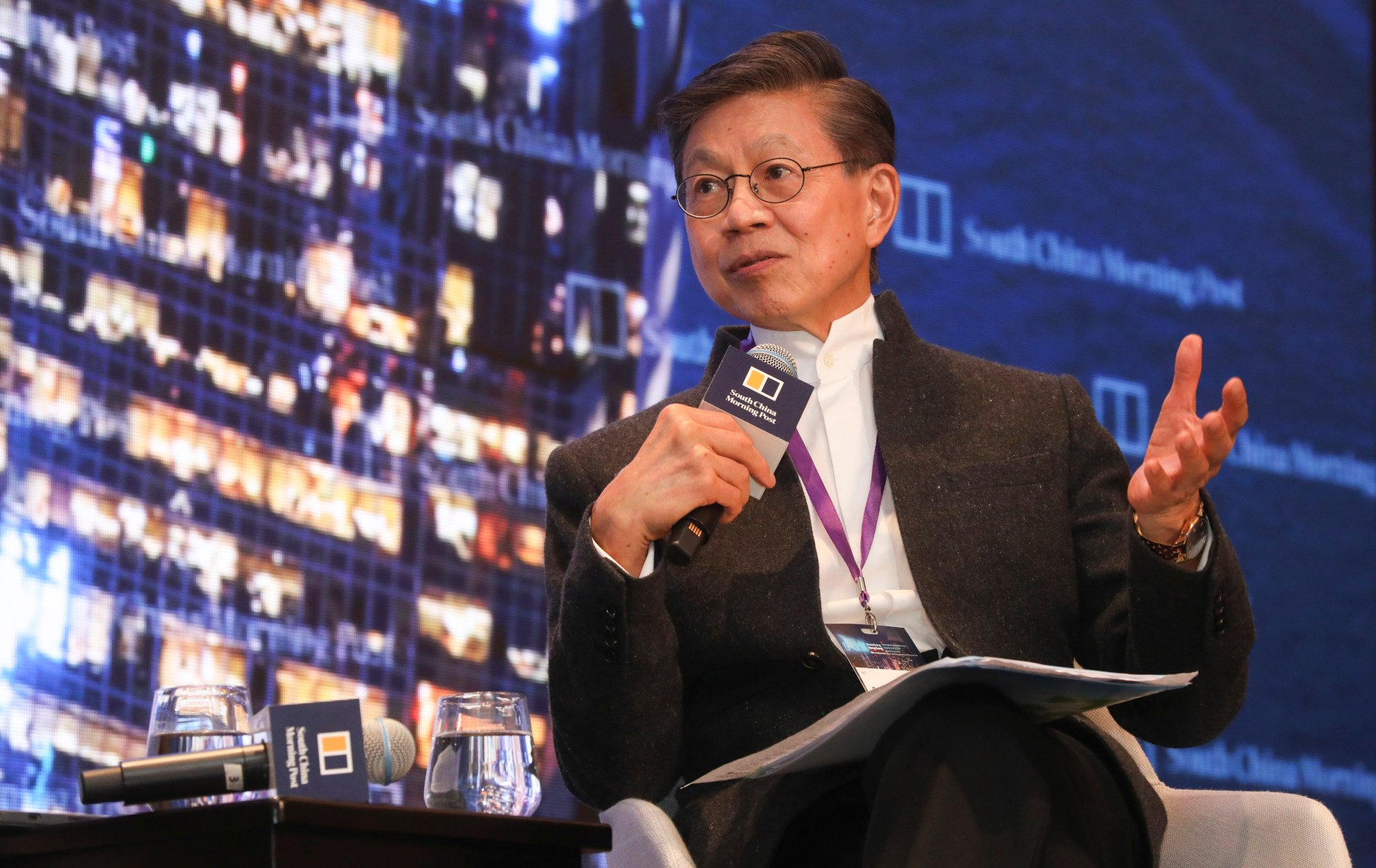
Hong Kong’s deputy chief secretary has appealed to the private sector to capitalise on the booming silver economy and provide more care services for the city’s ageing population, as experts called for better collaboration between the medical and social services sectors to help the elderly.
Warner Cheuk Wing-hing on Tuesday noted that the elderly’s increased spending power had allowed them to seek out more sophisticated and comprehensive services.
He explained that a growing economy meant the elderly were “becoming more financially and physically capable than ever before”, presenting opportunities for the private sector.
Cheuk urged the private sector to grasp the potential of the market by identifying and addressing specific needs and preferences.

Professor Yeoh Eng-kiong of Chinese University discusses the future shape of care for the increasing numbers of elderly Hongkongers. Photo: Sun Yeung
He also asked for more self-financed community care services and high-quality residential care homes for the elderly from private service providers.
“This will help to give more options to elderly persons of all kinds of backgrounds and make Hong Kong’s long-term care services more financially sustainable in the long run,” he said.
The call came as Cheuk delivered a speech at a “Redefining Hong Kong” event, organised by the Post, which focused on the city’s policies for the elderly and silver economy.
Hong Kong has one of the highest life expectancy rates in the world – 87 years for women and 81 years for men. The city’s birth rate, however, plunged to a record low of 0.9 last year.
The city is home to about 1.64 million people aged 65 or above, about 22 per cent of the population.
Demographic projections suggest the number of elderly people will increase to 2.75 million by 2046, more than a third of city residents.
Cheuk said the government’s policy was centred on “ageing in place as the core, with institutional care as backup” with a range of services to meet the needs of the elderly, including those provided through public-private partnerships.
He highlighted that the government had launched residential and community care vouchers for the elderly, who could use them to buy services provided by non‑governmental and private organisations.
Cheuk added authorities had also relaxed restrictions under a scheme to encourage private developers to build more high-quality care homes for the elderly.
He said the private sector should contribute to elderly resident’s continuous learning through sponsorships, the provision of venues, sharing expertise and the development of programmes designed to satisfy their requirements.
Experts at the event agreed there was a need for closer collaboration between the medical and social sectors to better support the elderly.
“The role of the social worker and the role of the medical [professional] actually may be slightly different,” Dr Donald Li Kwok-tung, chairman of the Elderly Commission, said. “They need to work together … in maintaining a healthy lifestyle and early prevention.”
Professor Yeoh Eng-kiong of Chinese University, a former health secretary, said the present level of medical-social collaboration was not effective because of a lack of interdisciplinary approaches.
“They are very siloed … The medical people and education do not interact with the social sector,” he said.
He added policies should be more intersectoral and programmes more interdisciplinary.
Yeoh, the director of Chinese University’s Centre for Health Systems and Policy Research, added that one of the key roles that the district health system could play was in boosting the connection between healthcare and the public.
“They need to go into the community,” Yeoh said. “You don’t just sit there and wait for people to come … we need to be a resource hub that is providing the resources to connect with the community.
“That connectivity is very important for longer-term healthy ageing,” Yeoh added.
News Related-
Hong Kong district council election: unsuccessful poll contenders not in the running for appointed seats under revamped system, minister says
-
Hong Kong police to recruit 137 city students from mainland Chinese universities following year-long talent attraction drive
-
Hong Kong primary school pupils may not need to sit written tests, exams in new humanities subject, education minister says
-
COP28: To cut carbon, Hong Kong must first learn to put a price on it
-
Hongkongers in subdivided flats offered health checks, support from social workers under scheme by Jockey Club, local university
-
Operation Santa Claus: Hong Kong centre helps ethnic minority children with special needs get on track
-
Why Hong Kong must adopt nature-based solutions in the Northern Metropolis
-
‘Time travel’ tourism in Hong Kong – could it be the boost the city needs to attract more international visitors?
-
‘You have to adapt’: why Hongkongers living in UK feel move was worth it, despite less money and fewer friends
-
Red panda population at Hong Kong Ocean Park to increase, as more on the way from mainland China
-
Drug giant AstraZeneca to open Hong Kong R&D centre by late 2024 at earliest with focus on cell and gene therapies
-
Hong Kong government pilots fly into eye of typhoons to better understand their secrets
-
Hong Kong’s Cathay Pacific expects first annual profit in 4 years, passenger numbers to reach 95% of pre-pandemic levels
-
How Hong Kong will benefit from a more diverse civil service
